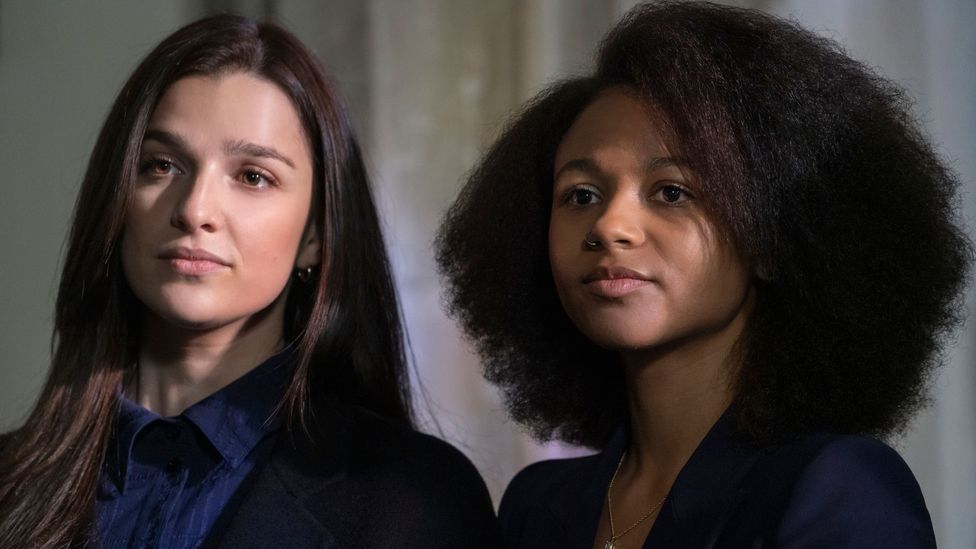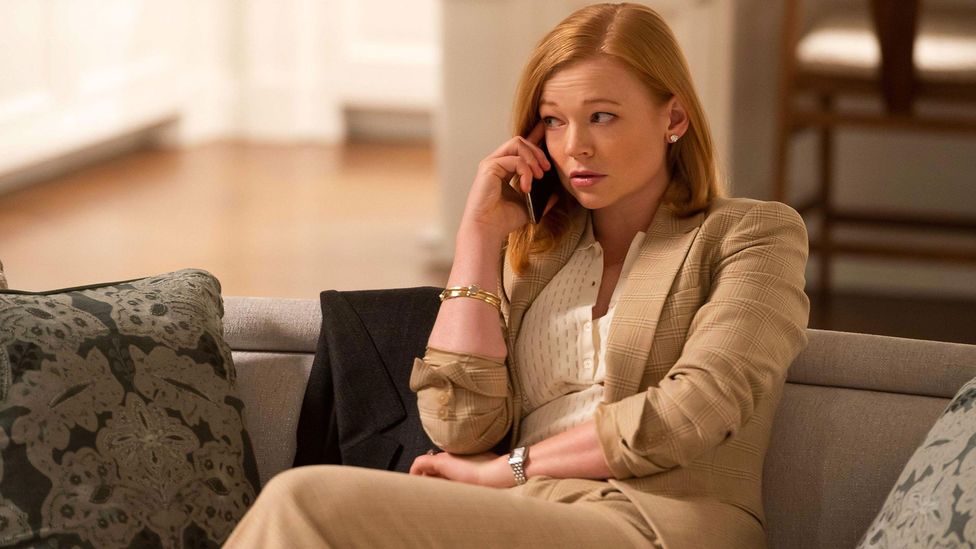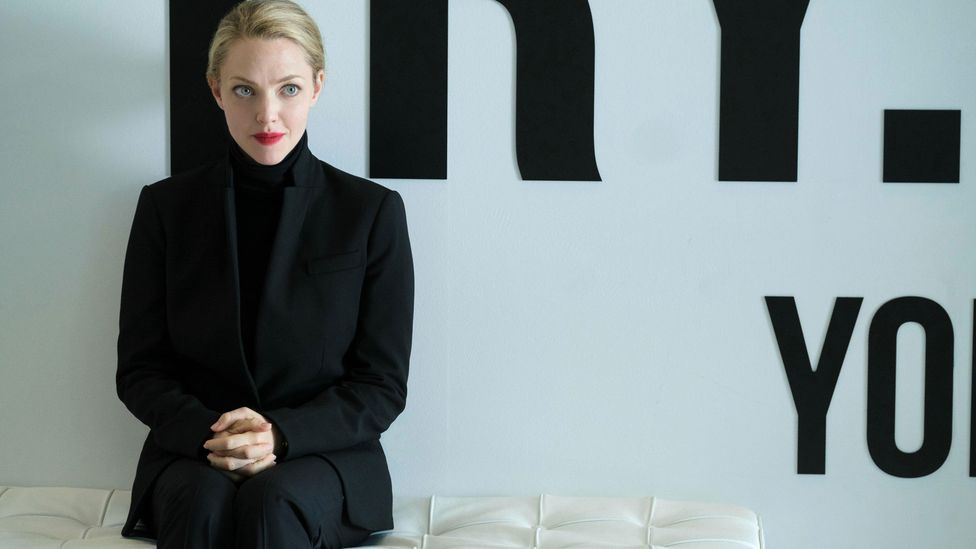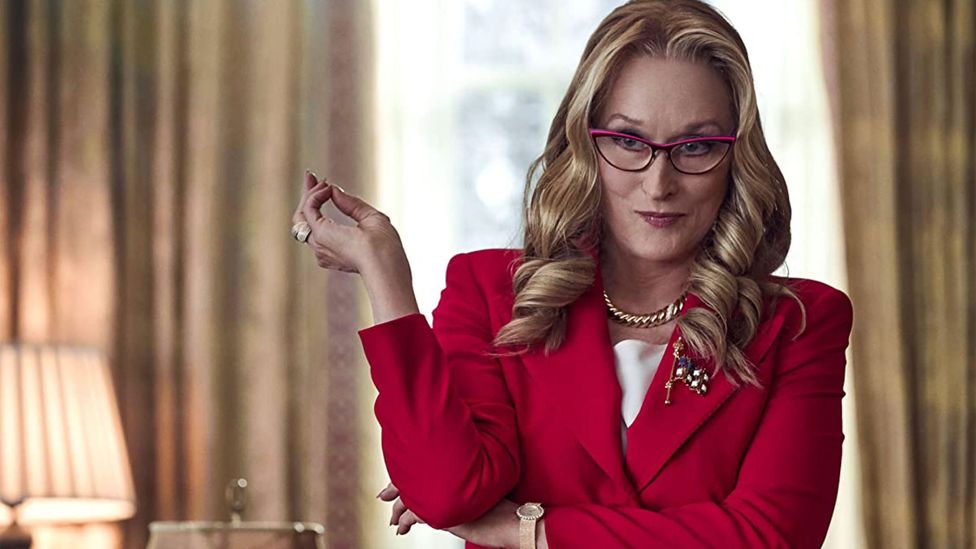The latest female villains

In the new series of Industry, the HBO drama about young bankers in London that has just returned after the first season proved a zeitgeist-y hit, we see that Yasmin (Marisa Abela), previously a naive graduate, has risen through the ritual humiliations of the Pierpoint & Co foreign exchange desk. She holds court at lavish client dinners, enjoys a hedonistic nightlife and makes deals the morning after, strutting around the finance floor in power designer suits. To borrow social media vernacular, she is totally bossing it.
More like this:
– 10 TV shows to watch in August
– What no-one says about being a mother
– Is this TV’s most toxic stereotype?
But when a new trainee, Venetia (Indy Lewis), joins her desk, Yasmin has no intention of making life easy for her. She tells her that she’s expected to get everyone lunch each day and to “get used to dimming her light”. “Sorry, I just don’t think that’s what I’m here to do,” the confident Venetia responds. “Let me tell you this for free…” Yasmin whispers, a bright smile failing to hide the daggers coming from her eyes, “you need to get everyone on side, there is a system”. Despite Yasmin having only recently been in Venetia’s position herself, it’s clear she has no intention of helping her out: instead she’s pulling up the ladder behind her.

With its focus on female leads Yasmin and Harper, the second series of Industry implicitly critiques the “girlboss” mentality (Credit: HBO)
It’s a scene that reflects the criticism increasingly directed at one particular modern female archetype: the so-called “girlboss”. For a while, when the term came to popular use midway through the last decade, it was a positive, aspirational term designed to refer to the ideal of a go-getting 21st Century career-focused woman. However, these days, while it is still part of common language on social media and otherwise (with 26.6 million Instagram posts using the hashtag girlboss and counting), it is also used in a more derogatory fashion – to refer to a woman practising what critics say is a kind of corporate faux-feminism, that is focused on her own self-empowerment at the expense of others, and especially other women.
It’s a phrase that has been wielded notably against highly-privileged female celebrities and influencers making what many have seen as tone-deaf statements about their own industriousness and other people’s inferior work ethics – most famously, when Kim Kardashian complained to Variety that “nobody wants to work these days”. And if critique of the concept has been going on for a while – in articles such as The Atlantic’s 2020 essay The Girlboss Has Left the Building – then it is now showing up in TV and film in a conspicuous way. There is also the popular phrase “Gaslight, Gatekeep, Girlboss” that has entered popular culture as a succinct, satirical summation of what critics see as the malign girlboss ethos.
The origins of the backlash
In fact, the societal attack on the girlboss can be traced back to a TV show – Netflix’s 2017 series Girlboss which was a fictionalised adaptation of the memoir of the same name that had first popularised the phrase: #Girlboss, by young entrepreneur Sophia Amoruso, owner of the online fashion store Nasty Gal. The core of Amoruso’s book, which was as much self-help manual as autobiography, was the “inspirational” tale of a woman making a success of her life in a pervading patriarchal society and “hustling” (having the resourcefulness and drive) to achieve her ambitions. “Race balls-out toward the extraordinary life that you’ve always dreamed of,” she instructed readers.
Amoruso’s individualist theories for getting ahead as a woman aligned with other powerful female figures in the headlines at the time, like Sheryl Sandberg, the now-soon-to-be-ex COO of Meta (formerly known as Facebook). In her seminal 2013 book, Lean In, she directed women to become more assertive at work and at home and warned that being “relentlessly pleasant” can hinder them. It was a contentious book from its release and faced criticism from journalist Susan Faludi for making women turn themselves into “marketable consumer objects“. Meanwhile the late author and activist bell hooks said that Sandberg ignored “the concrete systemic obstacles most women face inside the workforce“.
Similar criticisms were applied to Amoruso’s #Girlboss mission statement, and when it was translated to screen the arguably problematic aspects of her philosophy became that much more glaring. The series may have been produced in the hope of showing a feisty young girl making her way to self-made millionaire, but most critics felt it instead showed a demanding, often mean young woman taking advantage of those around her. The Guardian dubbed it “a tone-deaf rallying cry to millennial narcissists” while The Sociological Review felt it was even more harmful: “a dangerous depiction of female entrepreneurship“.
Adding to the backlash was the fact that in real life, Amoruso’s company was accused of not being as feminist as its owner made out. There were allegations of Amoruso firing three women before they were due to go on maternity leave: the company denied these claims and called them “frivolous and without merit” and the lawsuits were settled in arbitration. Before the Netflix series had even been released, Nasty Gal had filed for bankruptcy, with the company sold to retailer Boohoo and Amoruso stepping down as CEO. She then went on to set up Girlboss Media, which she also sold and then left in 2020.

Shiv in Succession is shown pretending to be an ally to other women to meet her own ends (Credit: HBO)
Other female-owned companies, led by “She-Eos” and similarly championed as progressive, also fell into disrepute around the same time, like Away suitcases, which was accused of exploiting and mistreating staff, as was the millennial make-up brand Glossier. Meanwhile elite all-female members club The Wing, considered a hub of girlbossery, was criticised for being too white, and allegedly exploiting its workers, and allowing incidents of racism and prejudice to go unchallenged.
Emilie Zaslow, a professor in communication studies at Pace University and author of Feminism, Inc: Coming of Age in Girl Power Media Culture, explains: “The concept of the ‘girlboss’ comes out of this 1990s and 2000s ‘girl power’ movement and I don’t think it was ever more than a shallow concept. I think it was a mass media absorption of a social movement. So while the idea of a girlboss did advance public conversation about gender and it is rooted in a kind of feminist ideology, it’s messy, and from the get-go that message has been watered down and made market friendly.”
She adds: “I don’t think it’s a coincidence that tropes like the ‘power bitch’ of the ’80s or the ‘girlboss’ of the past few years rise to popularity, first in the Reagan-Thatcher era and then in the Trump era. In these moments where we’re seeing regressive conservative political environments rooted in this ‘pick yourself up by your bootstraps’ mentality, we see a kind of female empowerment that is completely self-focused on independence and individual success and power over others. It’s not about unifying or building up, it’s about: what do I look like when I’m in charge?”
However if the girlboss movement – if you could call it that – has become ever more tainted, then it has certainly provided grist to the mill for TV and film creators, leading to a host of riveting, conflicted and refreshingly unlikeable female protagonists.
Everyone’s favourite girlboss
One of these is Shiv (Sarah Snook) in Succession – the award-winning HBO series about a media dynasty, in which, three series in, the patriarch Logan Roy is still deciding which of his adult children to bequeath his business to or not. The only female among her four siblings, Shiv is one of the show’s most compelling characters: super-sharp, she’s more than aware she needs to play the game in the male-dominated industry, and fight harder, and therefore dirtier, to be in with a shot of becoming CEO. The kind of sexism she has to deal with is exemplified by the moment in season three in which her brother Roman (Kieran Culkin) taunts her after he secured a deal with a (male) investor in saying, “All the men got together in a man club and we decided, sweetheart, that everything’s fine so just… shhh”. In a subsequent episode, he mocks her for her absence from a meeting by joking: “What were you doing, brunching with some other sock-puppet girlboss presidents?”
Shiv is forced to emulate the men around her so as not to appear weak, and place herself in her dad’s favour. When allegations of sexual abuse on the company’s cruise liners come to light, Logan offers her the role of president of domestic operations – on condition that she does some dirty work for him. Although she is being manipulated by her family and is aware she is being used for good “optics” (her other brother Kendall (Jeremy Strong) spits at her that, post #MeToo, “don’t you know girls count for double now?”) she does have her own agency to make ethical decisions. It’s just that she chooses not to. At a shareholder’s town hall meeting, she publicly downplays the abuse of employees and the company’s cover-up with empty corporate promises. She becomes complicit in whitewashing the suffering of other women so she can get ahead in her career.
Several times, too, Shiv has had run-ins with another Succession girlboss, Gerri (J Smith-Cameron). The most notable of these is in the third series where Shiv seeks to leverage power from Gerri – another rival for the CEO position – in a fake-feminist conversation in which she pretends to offer support to Gerri after she has received an explicit picture from Roman, while weaponising the incident against her: “If you don’t report him to HR then it could be argued that you welcomed these pictures… it undermines your position,” she says, barely hiding her glee.

A real-life figure who has been called an archetypal “girlboss” is Elizabeth Holmes, played by Amanda Seyfried (pictured) in recent miniseries The Dropout (Credit Alamy)
It’s the bluntest example of her pretending to be an ally to other women, but in a way that only serves her own interests – a girlboss without shame.
Also acting unapologetically is Marla (Rosamund Pike) in the 2020 film I Care a Lot. In a story that reflects real-life cases, Marla is a sociopathic con-artist exploiting legal loopholes to become a guardian of elderly people’s affairs and defraud them of their money.
In court, she claims to be acting in their interest – “Caring, sir, is my job, it’s my profession,” she tells a judge, “all day, every day I care”– but in private monologues to camera she tells us she believes: “Playing fair is a joke invented by rich people to keep the rest of us poor”. Slate magazine dubbed the film a “stinging indictment of neoliberal ‘girlboss’ feminism”, going on to say that “the brilliance of [the film] is that it illustrates how exploitation of other humans (regardless of gender) is key to so much of capitalism. Sure, Marla’s guardianship business is an extreme case, but it serves as a metaphor for capitalism at large, as it’s a means to an end for Marla – who desires power and money more than anything.”
Then there are the real-life “girlboss” grifters and hustlers that have had their stories turned into podcasts and documentaries, then dramatised: blood-testing scammer Elizabeth Holmes, played by Amanda Seyfried in Hulu’s The Dropout, and Anna Sorokin, the fake New York heiress who marketed herself as a budding entrepreneur and was the subject of Netflix’s Inventing Anna. In a piece around the real-life trial of the former, The Guardian‘s Arwa Mahdawi noted: “Like every other #girlboss, Holmes was moulding herself to a style of leadership that had been dictated by men, while using feminism as a marketing strategy.”
Defending the girlboss
Is girlbossing always something to be derided so readily, though? In Industry, one character who provides a starkly different counterpoint to the moneyed upper-middle-class Yasmin is the other young female lead Harper (Myha’la Herrold), a black American from a low-income, single-parent family who had to lie about going to university to blag her banking job. Harper could also be classed as a girlboss, in that she stops at nothing to get what she wants in a toxic male environment – and doesn’t think twice about screwing over those closest to her including, at the end of the first series, her female manager. But if her actions are patently unethical, we can perhaps more readily sympathise with what has led her to them.
Meanwhile, despite coming from different ends of the socio-economic spectrum, what both characters share is the fact they’re a product of their immediate environment: in that context, girlbossing hardly seems like a choice but a necessity. “As you watch the season there’s the question of how much can an institution change: can the individuals change the institution or does the institution change the individuals?,” says Industry writer and executive producer Jami O’Brien. “I think that the viewpoint of the show is that these institutions are very tenacious… I think the system is really hard to dismantle.” One punchy line in the new series comes when Yasmin jokes with her (male) boss, calling everyone around them a slang word for women’s genitalia, adding that they should all just “Lean in to it!” Does O’Brien think Yasmin has read Sandberg’s manifesto? “Oh definitely! I don’t think Harper would have been interested in reading it, though…”
Zaslow agrees that Industry is reflecting modern life within capitalist Western society: “Young women today in corporate positions and in business have been raised in this girl power media culture and that perspective has never been rooted in real collective change. So there’s pressure put on them, but that’s not the way they’ve been educated to think about success or feminism. Many young women are raised in this market where feminist equals individual success and empowerment, so they can say ‘I’m being a feminist’.”
The entitlement of older and more established “empowered” women is something that has similarly been critiqued in shows like Big Little Lies, with its famous moment of power mum Renata (Laura Dern) screaming “I will not not be rich!”, and The White Lotus, whose first series featured tech mogul Nicole (Connie Britton), the founder of a search engine business described as “part of the unravelling of the social fabric” by her cynical daughter. Having been name-checked as one of “10 power women in the tech world” in a listicle by journalist and fellow resort guest Rachel, Nicole then reveals where her real sympathies lie – with her over-privileged son. “He is a straight, white, young man and no one has any sympathy for them right now… in a way, they’re the underdogs now,” she bemoans.

Meryl Streep’s self-serving POTUS in Don’t Look Up was referred to as a “girlboss” president by many critics (Credit: Alamy)
Meanwhile in the 2021 film Don’t Look Up, Meryl Streep’s POTUS Janie Orlean – described by more than one critic as a “girlboss” president – is spectacularly uninterested in the imminent apocalypse in comparison to her own personal fortunes and branding. On being told that a “planet-killer” comet is headed to Earth, she comments that it just doesn’t really work for her right now: “Bottom line is, what’s this going to cost me? What’s the ask here?…The timing is atrocious.” Later, she tells a female member of her staff that she’ll have to take the fall for her failing to act sooner, before scientist Kate Dibiasky (Jennifer Lawrence) confronts her with the real reason she believes Orlean is finally taking action: because she “got caught” sending explicit pictures to her “porn star sheriff boyfriend, so now it’s to your advantage to act on the comet.” In this movie – a barely-concealed allegory of the climate change crisis – the self-centred and self-serving nature of this woman literally puts the entirety of humanity at risk. This is what will happen if we have a world led by myopic girlbosses, it seems to suggest.
Of course, it could be argued that this demonisation of girlbosses is, for some at least, an acceptable new form of misogyny – after all, do “boybosses” get pointedly targeted in such a way? Is all this anti-girlbossery simply a new way of taking down successful women, dressed up in a fancy new phrase? Zaslow thinks there are certainly elements of that at play within this cultural phenomenon: “I think successful women are always a threat to men, but I also think that misogyny operates at a deeper structural level; like thinking about who owns media, who collects data, who has control over that data – and misogyny and the patriarchy are at the root of that. On the flip side, who is positioned in the media as never enough, never satisfied, never body positive enough, never powerful enough? It’s women. Women are targets of most advertising and the whole commodity industry is built on women’s dissatisfaction – in that market economy, women can never win at being a boss. At that level, I think misogyny perpetuates that.”
Certainly, there are parallels to be drawn between today’s berating of the girlboss, and the way the career woman was often characterised as a crazed, power-hungry fiend in Hollywood films of the 1980s and 1990s like Fatal Attraction, Working Girl and Disclosure (the first two of which are currently in the process of being remade as TV series, incidentally). What’s noticeable among most of today’s screen girlbosses is that like those forebears, they too, are spiritually empty or fundamentally unhappy. Zaslow suggests that that these portrayals can tend towards the one-note: “In real life, women with power are complex and have diverse experiences, but popular culture generally relies on backlash rhetoric and depicts the girlboss as unhappy and dissatisfied. Even when women get access to power and success, it is often portrayed as a failure of feminism.”
On the other hand, perhaps all these unfulfilled girlboss narratives simply do reflect the Catch 22 of the system women find themselves locked into: implored to worship at the altar of self-empowerment to be successful, but then made to feel even more wretched when things go wrong because according to the ethos of the girlboss, the blame lies with them for not trying hard enough. Just like the big gambles made in the kind of financial institutions we see in Industry, the house always wins.
Industry is running on HBO in the US weekly and premieres on BBC One and iPlayer in the UK in the autumn.
Love film and TV? Join BBC Culture Film and TV Club on Facebook, a community for cinephiles all over the world.
If you would like to comment on this story or anything else you have seen on BBC Culture, head over to our Facebook page or message us on Twitter.
And if you liked this story, sign up for the weekly bbc.com features newsletter, called The Essential List. A handpicked selection of stories from BBC Future, Culture, Worklife and Travel, delivered to your inbox every Friday








